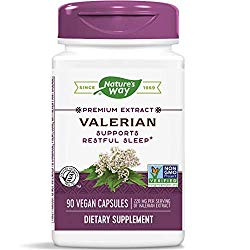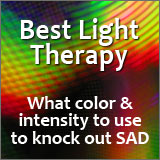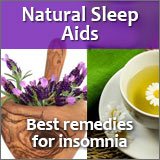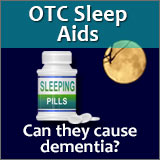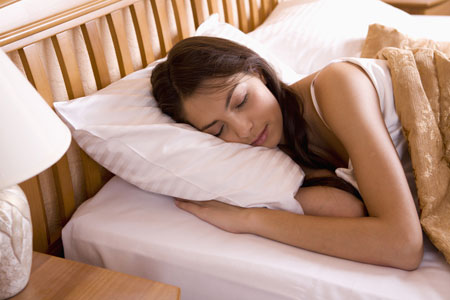How to Use Herbal Sleep Aids as Herbal Remedies for Insomnia
There are well over a dozen herbs that may work as herbal sleep aids to treat insomnia. For now, I'll be focusing on six that are a good guide to herbal sleep: valerian, lemon balm, hops, lavender, chamomile, and passionflower.
Some of these may be effective for you in getting better sleep—either in formula blends of nutrient and herbal supplements (see my article on 9 Natural Sleep Aids) —or as herbal teas and in tinctures.
One quick caution
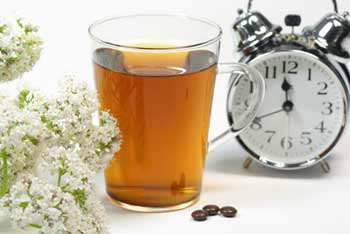
One thing you need to understand right off the bat is that herbs can be very powerful. Natural herb doesn't always mean no side effects. I remember the first time I drank green tea. It brought on a headache something fierce.
Just keep in mind that many drugs are based on herbs. That means you really need to follow directions when taking herbal sleep aid capsules or tinctures.
The first herbal sleep aid I want to start with is valerian (valeriana officinalis). This herb can be considered the workhorse herbal sleep aid. That's because it does help many people with sleep problems sleep better. And valerian is considered GRAS by the U.S. FDA, meaning Generally Recognized As Safe.
What is the effect of valerian and how can it help you sleep?
It appears to be particularly effective in helping people fall asleep. It also improves the quality of sleep. And for some, it helps with anxiety.
But like many natural substances, it seems that the studies on valerian herbal sleep aids have conflicting data.
Will it work for you? I've said it many times before, and I sound like a broken record, but what works for Joe might not work for Jill. Fortunately, all reputable supplement companies have strong guarantees so we can get our money back if their products don't work for us.
The thing is though, you have to have patience when using Mother Nature's treatments as a remedy to promote sleep, or whatever else ails you.
Give these natural supplements time to work!
For example, in one well-done study, using valerian for insomnia was tested against a placebo. In case you don't know what a placebo is, it's a fake pill, like a sugar pill. There's no active ingredient in the pill and it won't have any physical effect on a study participant.
Anyway, during the first two weeks of the valerian study, those people taking the placebo and those taking a 600 mg extract of valerian had about the same results...nothing worked. But interestingly, after 28 days, valerian came out way ahead. The majority of participants taking the valerian herbal sleep aid rated it as good or very good.
Other studies have shown that use of valeriana officinalis (the official name for valerian) has an almost immediate effect.
The point here is, studies do show valerian works and it just may work for you. Especially if you have trouble with sleep onset...or if you often wake up feeling like you had a lousy night's sleep, valerian might do the trick.
So, how to take valerian to relieve insomnia?
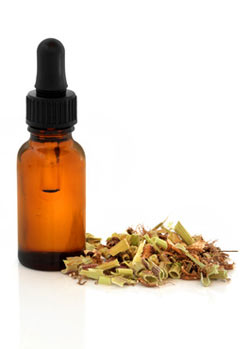
First, let me just say, if you've never tasted valerian tea, it's nasty stuff. To me it was like drinking liquid dirt.
Thankfully there are capsules, supplement blends, and tinctures you can take. Typical effective doses of valerian root extract by itself used in studies appear to be anywhere from 400 to 900 mg daily. (Note that it's the root extract part of the herb that has been used for a long time as a sedative).
If using an aqueous extract of valerian, take a couple droppers (30 to 60 drops) of the tincture in a cup of hot water, somewhere around half hour to an hour before bedtime. No matter what form you take it in, always take it according to the directions on the package.
One good thing to note is that valerian does not have any significant side effects. However, everyone is different. Some people may experience headaches, upset stomach, uneasiness, or even feel stimulated by it.
In addition, there's no habit-forming risk like there is with sleep medications and valerian extracts don't produce a morning hangover effect like drugs can. Studies have also shown that effects of valerian are safe if it's used as long as 28 days. Long term use is not clear.
Some suggestions on what valerian herbal sleep aid to try
If you’re interested in trying valerian, I would recommend you stick with a supplement that has a standardized valerian extract.
You also have to be careful about the heavy metals lead and cadmium in valerian supplements.
In addition, because there is scant information on valerian use for children and for women who are pregnant or nursing, valerian is not recommended for these individuals.
Fortunately, you can get an excellent valerian supplement over at Amazon. And it’s inexpensive!
It’s called Nature’s Way Valerian. There are 90 vegan capsules and as of February 2020, one bottle is only $6.90.
Click this link or the bottle above, check out the reviews, and go from there.
If you decide valerian is not for you, here’s another good choice
I don’t know if you are familiar with Dr. Terry Grossman M.D.
and the great mind of Ray Kurzweil (an inventor as well as an author of some
remarkable books on health and longevity such as Fantastic Voyage).
Transcend, the company these two men own, has a sleep aid on Amazon called Sleep Potion no. 9. In their clinical trials, they discovered that the combination of ingredients in the supplement worked together to help many people fall asleep faster and sleep longer.
So, while you’re checking out Nature’s Way, be sure to also take a look at Transcend’s Sleep Potion no.9. It’s expensive yet may help you with those occasional sleepless nights.
Three other important tips
Mark Stengler, N.D. points out in his book, The Natural Physician's Healing Therapies that 1) People should not take valerian in combination with tranquilizers or antidepressants. 2) Always consult your doctor or healthcare professional before taking valerian if you're also taking medications. 3) And avoid taking high doses of any extract of valerian root if you're going to drive or operate machinery.
I would also add that valerian and alcohol should never be used together and you should always discuss with your health care professional any supplements you are taking.
And another tip. If you intend to use herbal remedies for insomnia instead of sleeping pills, try to find a good herbalist in your town. Or at least get good information from some of the excellent authors out there.
For whatever health problem you may have, I highly
recommend the writings of James A. Duke, Ph.D., a medicinal herb expert. His book, The Green Pharmacy, has been in my home library for many years and I have referred to it often.
In part 2, we'll look at research that has shown that taking
valerian with two other natural herbal sleep aids, lemon balm (also
known as melissa or melissa officinalis), and hops, seems to promote
better sleep. You can read that article right now by clicking the link
below.
Here are more articles you will find helpful
Part 2: More Herbal Remedies For Insomnia: Turn Off Your Mind
Part 3 Herbs for Sleep: Hops
Part 4 Sleep Aid Herbs: Secrets to Sleeping Well Using Passionflower
Part 5: An Herbal Sleep Remedy for Egyptian Mummies?
Part 6 of Herbal Sleep Remedies: Chamomile
Do Homeopathic Sleep Aids Work?
Herbs for Sleep Apnea Symptoms
View a few back issues of my interesting newsletter, Sleep Chat, here.
Plus receive three free gifts for subscribing. Note: I don't post all
back issues.
Return From Herbal Sleep Aids to Sleep Passport Home Page
